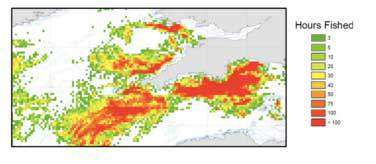The project ‘Ecosystem approach to fisheries’ (2007-2012) developed and tested methods to support the implementation of an ecosystem approach to fisheries, thus contributing to the evidence base that supports the co-ordination and integration of fisheries and environmental management.
The main objectives were to develop and test linked state and pressure indicators focused on the state of seabed habitats, biodiversity and fish communities (food webs). These were identified in an initial assessment as the system components that were most likely to be impacted unsustainably by fishing.
New models were developed, and existing models modified, to predict
- how the intensity and distribution of fishing activity affected biomass and production of seabed habitats,
- how the structure of fish communities and food webs changed with fishing mortality and
- how the biomass and reproductive potential of sensitive fish species changed with fishing mortality.
New methods for describing the intensity and distribution of fishing activity were also developed, based on the analysis of satellite vessel monitoring system data. A model of fishing vessel displacement in response to area closure was developed to assess the effect of closed areas on the distribution of fishing activity and the consequences for seabed habitat.

The project findings suggested that future work should focus on further defining, developing and testing harmonised assessment and management methods to help meet fisheries and environmental objectives and targets in a transparent, consistent and cost-effective way.
References:
http://randd.defra.gov.uk/Document.aspx?Document=10372_M1001FinalReportEvid-4March2012final.pdf
